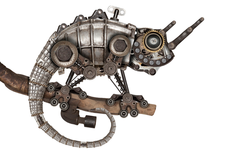Microcontroller programming with BBC micro:bit
Pocket-Size Programming

© Lead Image © Burmakin Andrey, 123rf.com
Designed for students, the BBC micro:bit, in conjunction with MicroPython and the Mu editor, can help you get started with microcontroller programming.
The idea of developing a microcontroller for schools dates back to 2012. In 2016, in cooperation with the University of Lancaster and several dozen industry partners, the British Broadcasting Corporation (BBC) delivered on this concept with the BBC micro:bit [1]. Although developed for seventh grade students, the BBC micro:bit offers an introduction to microcontroller programing for users of any age.
You can purchase the micro:bit individually for $14.95 or as the micro:bit Go Bundle (which includes batteries, a battery holder, and USB cable) for $17.50 from Adafruit [2].
The microcontroller and its components fit on a 5x4cm board (Figure 1). The 32-bit processor, an ARM Cortex-M0, runs at a clock speed of 16MHz. The micro:bit offers 16KB of RAM and a 256KB flash memory. In principle, a Bluetooth Low Energy (BLE) radio is also available. See Table 1 for more specifications.
[...]
Buy this article as PDF
(incl. VAT)